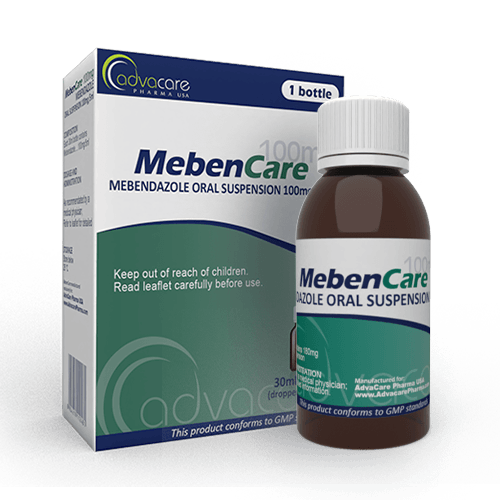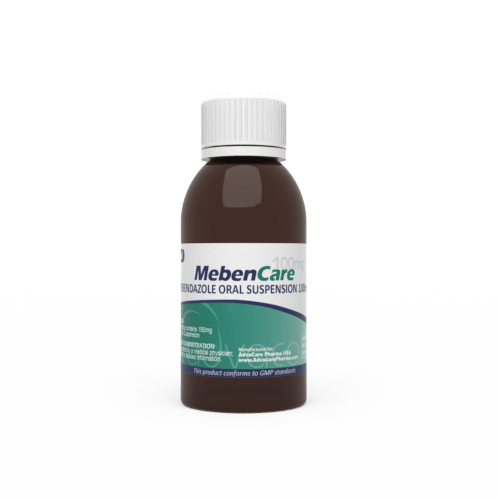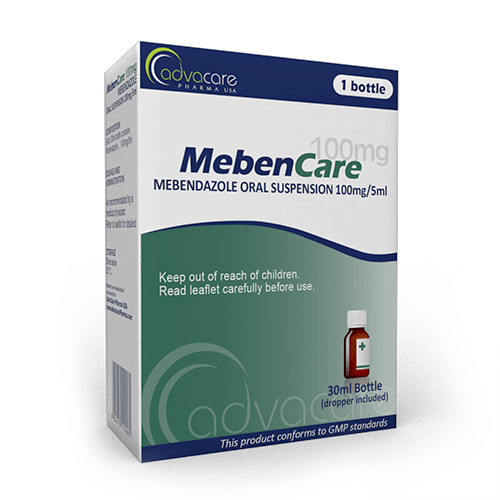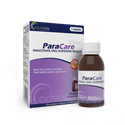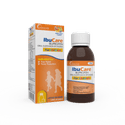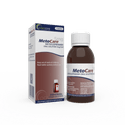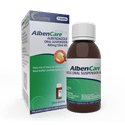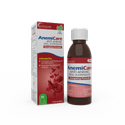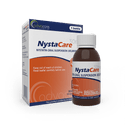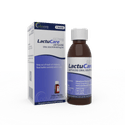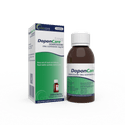- Home›
- Pharmaceuticals›
- Pharmaceutical Suspensions›
- Oral Suspensions›
- Mebendazole Oral Suspension
Mebendazole Oral Suspension
Dosage
Packaging
What is Mebendazole?
Active Ingredients: Mebendazole
Mebendazole Oral Suspension is a broad-spectrum antiparasitic drug used for treating mild to moderate infections caused by worms. It is effective against roundworms, hookworms, pinworms, and whipworms in single or mixed infections. Mebendazole is safe and effective for use in patients over two years of age.
Mebendazole is sometimes used to treat tapeworm infections, but it should be noted that there has not been evidence that it is effective against some types of infections, such as cysticercosis.
Mebendazole is classified within the drug family called anthelmintics. It is a benzimidazole derivative. This drug works by inhibiting tubulin polymerization, which interferes with the worm's ability to utilize glucose. This action results in its immobilization and death.
Mebendazole Oral Suspension is produced with a dosage of 100mg mebendazole per 5ml of suspension. It is available in a 30ml bottle.
AdvaCare Pharma is a global distributor of Mebendazole Oral Suspension. We offer a wide range of high-quality and cost-effective medications that are available for exportation. These pharmaceutical products are manufactured in one of our strategically located GMP-certified facilities in China, India, and the USA.
Why are we a quality Mebendazole manufacturer?
AdvaCare Pharma, a GMP-compliant pharmaceutical company, specializes in the manufacture of Mebendazole Suspension. Our strategic manufacturing locations and innovative management systems ensure full control over the supply chain, resulting in enhanced quality standards and decreased costs throughout the production, transport and import processes. As a trusted Mebendazole manufacturer, we globally supply a comprehensive range of 55+ oral liquid medicines in suspension dosage form to more than 65 countries.
Uses
What is Mebendazole used for?
It is used to treat gastrointestinal infections caused by parasites such as:
- roundworms, e.g. Ascaris lumbricoides, Trichinella (T spiralis), Trichostrongylus, Capillaria philippinensis
- hookworms, e.g. Ancylostoma (A caninum, A duodenal) and Necator americanus
- threadworms/pinworms, e.g. Enterobius (E vermicularis) and Oxyuris
- whipworms, e.g. Trichuris trichiura
How is Mebendazole Oral Suspension used?
This medication is manufactured as a liquid. It is intended to be taken orally. Mebendazole can be taken with or without food, but it works best if taken at mealtime, particularly meals that are high in fat, as this helps the body absorb the drug.
This drug should be taken at the same time every day, and it should be taken for the entire duration of treatment, even if symptoms improve.
The bottle should be shaken well before use.
How should Mebendazole Oral Suspension be stored?
This medicine should be stored in a dry location at room temperature. It should be protected from heat or excessive light.
What happens if a dose is missed?
The forgotten dose should be taken as soon as possible. If it is nearly time for the next dose, then the missed dose should be skipped. Two doses should not be taken at the same time.
What dose should be taken?
Adult Dosing Dosage may vary based on different medical indications:
- For pinworm (Enterobius) infection, the usual dose is 100mg mebendazole (5ml of the suspension) as a single treatment. If re-infection is suspected, it is recommended to repeat the dose after 2-3 weeks. It is recommended to treat an entire household if there is one case present.
- For whipworm (Trichuris) infection, the usual dose is 100mg mebendazole (5ml of the suspension), given twice daily for 3 days. The course can be repeated once after 3 weeks.
- For roundworm (Ascaris) infection, the usual dose is 100mg mebendazole (5ml of the suspension) given twice daily for 3 days. The course can be repeated once after 3 weeks.
- For hookworm (Ancylostoma, Necator) infection, the usual dose is 100mg mebendazole (5ml of the suspension), given twice daily for 3 days. The course can be repeated once after 3 weeks. Alternatively, a dose of 500mg could be given as a single dose.
- For capillariasis due to C philippinensis, the usual dose is 200mg, given twice daily for 20 days.
- As an alternative treatment of trichostrongylosis, the usual dose is 100mg mebendazole (5ml of the suspension), given twice daily for 3 days.
- As an alternative treatment for trichinosis, the usual dose is 200-400mg, given 3 times per day for 3 days, followed by 400-500mg, given 3 times per day for 10 days. Steroid therapy is also recommended for severe symptoms.
- For toxocariasis (visceral larva migrans), the usual dose is 100-200mg, given twice per day for 5 days. The exact duration of treatment is not defined, and may extend up to 20 days. For severe symptoms or toxocariasis affecting the eyes, treatment should continue for 2-4 weeks. Steroid therapy is also recommended for these cases.
- For filariasis due to Mansonella Perstans, the usual dose is 100mg, given every 12 hours.
- For giardiasis due to Giardia Duodenalis, the usual dose is 200mg, given every 8 hours for 5 days.
Hepatic and renal dosing adjustments are not defined for this medication.
Pediatric Dosing Recommended dosage for children may vary based on different medical conditions:
- For pinworm infection, the usual dose for children over 2 years old is 100mg mebendazole (5ml of the suspension) as a single treatment. The dose can be repeated once after 3 weeks.
- For whipworm (T trichiura) infection, the usual dose for children over 2 years old is 100mg mebendazole (5ml of the suspension), twice daily for 3 days. The course can be repeated once after 3 weeks.
- For roundworm infection, the usual dose for children over 2 years old is 100mg mebendazole (5ml of the suspension) twice daily for 3 days. The course can be repeated once after 3 weeks.
- For hookworm infection, the usual dose for children over 2 years old is 100mg mebendazole (5ml of the suspension), twice daily for 3 days. The course can be repeated once after 3 weeks.
- For capillariasis due to C philippinensis, the usual pediatric dose is 200mg, given twice daily for 20 days.
- As an alternative treatment of trichostrongylosis, the usual pediatric dose is 100mg mebendazole (5ml of the suspension), given twice daily for 3 days.
- As an alternative treatment for trichinosis, the usual pediatric dose is 200-400mg, given 3 times per day for 3 days, followed by 400-500mg, given 3 times per day for 10 days. Steroid therapy is also recommended for severe symptoms.
- For toxocariasis (visceral larva migrans), the usual pediatric dose is 100-200mg, given twice per day for 5 days. The exact duration of treatment is not defined, and may extend up to 20 days. For severe symptoms or toxocariasis affecting the eyes, treatment should continue for 2-4 weeks. Steroid therapy is also recommended for these cases.
Refer to a doctor or pharmacist for guidelines on dosage. Do not exceed the advisable dosage. The exact dosage is based on medical condition, response to treatment, age, and weight.
Who can use Mebendazole?
Mebendazole Oral Suspension can be administered to adults and children, but caution is advised for specific groups of patients.
Pregnant It is not known whether mebendazole may cause fetal harm. There is little evidence regarding the use of Mebendazole during pregnancy, and it should only be used if the benefits outweigh the risks.
Breastfeeding Mebendazole is known to be excreted in milk. Though there have been no reports of adverse outcomes, it should be used cautiously for breastfeeding women.
Children This medication is not recommended for children under 2 years old. There have not been enough studies to establish safety for this age group. There have been reports of convulsions in this population, particularly in infants. When treating children below 2 years old, the benefits must be weighed against the risks. In young children, mebendazole is only recommended if the worm infestation is significantly interfering with nutritional health and physical development.
Geriatric This drug is considered safe for this elderly population, though it should be noted that liver impairment is more common among elderly patients.
Other warnings
In patients with hepatic impairment, this medication should be used cautiously, as the drug is metabolized by the CYP450 system.
Side Effects
As with all pharmaceuticals, some unwanted effects can occur from the use of Mebendazole Oral Suspension.
Common side effects include, but may not be limited to:
- headache
- loss of appetite
- stomach pain
- vomiting or diarrhea
- elevated liver enzymes
Seek medical attention if the following develop:
- seizures
- signs of an allergic reaction (rash, hives, itching)
- signs of a severe skin reaction, such as blistering or peeling skin or red skin lesions
High-dose therapy has been associated with the following serious reactions:
- neutropenia
- agranulocytosis
For a comprehensive understanding of all potential side effects, consult a medical professional.
If any symptoms persist or worsen, or you notice any other symptoms, please call your doctor immediately.
Precautions
Do NOT use Mebendazole Oral Suspension if:
- You are allergic to mebendazole or any of the other ingredients.
- You are pregnant or breastfeeding.
Before treatment, consult your doctor regarding any medications you are taking to address potential drug interactions.Some known drug interactions include cimetidine and metronidazole.
This medication may not be suitable for people with certain conditions, so it is important to consult with a doctor if you have any health conditions. Some conditions that may require additional considerations or monitoring include gastrointestinal problems (e.g. Crohn's disease, ulcerative colitis), liver problems, anemia (low blood count), and diabetes.
Pinworm infections can be contagious among households, so it is advised to treat the entire household at the same time in order to prevent infection or re-infection.
Hookworm and whipworm infections may cause anemia, so it may be necessary to take iron supplements during the treatment.
The formulation for this medication may contain sucrose. This product may not be suitable for patients with fructose intolerance, glucose-galactose malabsorption, or sucrase-isomaltase insufficiency.
References
Mebendazole in the treatment of helminthiasis
Mebendazole is a new broad-spectrum anthelmintic, that was used to treat patients with nematode infections--ascariasis, trichuriasis, and hookworm.
For adults, the recommended dosage was 100mg twice daily for 3 days, while for children, it was 50mg twice daily for 3 days. Analysis of stool specimens before and after treatment revealed a reduction of over 99% in egg count per gram of stool across all three types of infection following mebendazole administration.
The overall cure rates for the infections were as follows: 86.8% (59/68) for Ascaris lumbricoides, 86.0% (37/43) for Trichuris trichiura, and 85.7% (24/28) for hookworm. Mebendazole demonstrated equal efficacy in treating both light and heavy infections. No significant adverse effects were observed with this medication.
This study suggests that mebendazole is the preferred treatment for trichuriasis and mixed nematode infections.

You might be interested in...
Why AdvaCare Pharma?
As an industry leader, we are aware of our responsibility to provide affordable and sustainable solutions to improve healthcare worldwide.
